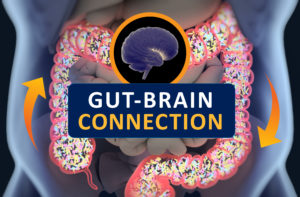
What Does Your Gut Have To Do With Your Mood?
If you’re struggling with anxiety or depression, you know how devastating it is to your life. Being anxious and depressed may also be accompanied by physical symptoms such as gas, bloating, constipation, diarrhea or heartburn.
You’ve probably been told that your anxiety or depression is due to chemical imbalances in your brain, but new research is showing that imbalances in the gut microbiome may be to blame for your symptoms.
Your gut microbiome consists of over 100 trillion microorganisms, including thousand of different types of both beneficial and harmful bacteria that can be harmful to your health and affect your moods.
Antibiotics, stress and consuming a diet low in fiber and high in refined carbohydrates, trans fats and added sugars have been shown to disrupt the delicate balance of the microbiome.
If the levels of good bacteria decrease and an overgrowth of bad bacteria (dysbiosis) takes place, bloating, belly pain, constipation and other GI problems can develop.
How Does Your Gut Influence Your Brain?
Your microbiome communicates with your brain through the use of neurotransmitters, hormones and other factors.
Neurotransmitters such as serotonin and dopamine are made by the nerves and microbes in your gut.
The vagus nerve is the direct line of communication between your gut microbiome and your brain.
When pathogens overwhelm the good bacteria in your gut, the production of neurotransmitters can decrease, leading to anxiety or depression.
Since 95% of your serotonin is made in your gut, an imbalance in gut microbes can actually influence how you feel, your emotions and your overall happiness.
Inflammation in the GI tract places stress on the gut microbiome through the release of cytokines (inflammatory chemicals) and neurotransmitters leading to inflammation throughout the body.
Ways That Your Microbiome Can Contribute To Anxiety And Depression
- Leaky gut – stress, antibiotics and poor diet can cause an opening of the tight junctions that line your intestinal tract and allow bacterial toxins, viruses and proteins to leak out of your intestine and into your bloodstream. Your body reacts to these foreign substances entering the blood by producing inflammatory chemicals.
- Inflammation – zonulin is a protein that is released when you have leaky gut or when you have an overgrowth of bad bacteria, yeast of parasites.
- This protein opens up your intestinal tight junctions, allowing bacterial toxins into your bloodstream.
- Just as zonulin opens your protective gut lining, inflammatory molecules (cytokines), also increase the permeability of the blood-brain barrier.
- The leaky gut can now cause a leaky brain. This chronic inflammation can decrease neuronal firing and can be linked to the symptoms of anxiety and depression.
- In return, altered brain output can also decrease its communication with your gut, impairing it’s function, causing a vicious, perpetual cycle of inflammation such as digestive issues, fatigue and other symptoms.
- Stress response – from an early age, your microbiome modulates your stress response. As you age, changes in the health of your microbiome affects how you respond to stress.
- Stress and negative emotions such as anxiety sadness, depression, fear and anger can all negatively affect your GI system.
- These triggers can speed up or slow down the movements of your GI tract and the contents within it; make the digestive system overly sensitive to bloating and pain; make it easier for bacteria to cross the gut lining and activate the immune system; increase inflammation in the gut; and change the types of bacteria that reside in the gut.
- A dysfunction in gastric enzyme production affects digestion and processing of food and can lead to leaky gut, which can contribute to the development of anxiety or depression.
How To Restore Balance To Your Gut And Brain Health
- Eat a healthy, balanced anti-inflammatory diet such as the Mediterranean diet consisting of organic vegetables, fresh fruit, wild caught fish, organic chicken, turkey, duck, pastured meats, nuts, seeds and cold pressed olive, avocado or coconut oil.
- Avoid processed foods, GMO’s, hydrogenated fats, gluten, chemical additives, fast foods and sugary foods.
- Try lowering your stress levels by spending time with friends and family, finding a type of exercise that you enjoy, or doing yoga, deep breathing or meditation. Watching You Tube talks about The 3 Principles is an effortless way to lower stress levels.


